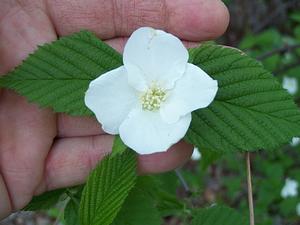View All Plants :: View All DECIDUOUS SHRUBS
Rhodotypos scandens
Jetbead
Plant Type:
DECIDUOUS SHRUBSRhodotypos scandens - I remember seeing Black Jetbead in Riverside Park when I lived on the Upper West Side of Manhattan. It was planted in shade, stuck in miserable, compacted soil that went way too dry in drought-stricken summers. Yet, seeming not to notice for Black Jetbead flowered beautifully with pure white florid and elegant squat, open-faced trumpets at tips of stems. Soon to follow were the hard, glossy and persistent black elliptical berries. When I say "persistent" I mean they lasted not only through the fall and winter but well into the following spring. Opposite leaves are bright green, an added attraction and doubly serrate. They sometimes turn strong yellow in the autumn and with the black berries above the interest isn't bad! This old-fashioned shrub is certainly not imbued with exceptional multiple seasons of interest but it is attractive and in that it can tolerate conditions in which other more beautiful but more persnickety plants would languish it has definite uses. Frankly, planted en masse it can be downright handsome. Full sun for best performance but tolerant of open shade planted in average to fertile soil. It can withstand difficult conditions and come up smelling like a rose... incidentally, Black Jetbead is a member of the family, Rosaceae. Cutting grown.
Characteristics and Attributes for Rhodotypos scandens
Season of Interest (Flowering)
- Late Spring / Summer
Season of Interest (Foliage)
- Spring / Summer
Autumn Interest
- Fruit / Berries / Seed Heads
Nature Attraction
- Deer Resistant
Light
- Shade Tolerant
- Full Sun
Attributes
- Drought Tolerant
- Shrub Border
- Massing
- Hedgerow
Growth Rate in the Garden
- Moderately Fast
Soil
- Fertile
- Adaptable
- Draining
Origins
- Japan
- China
Propagated By
- Cutting Grown


